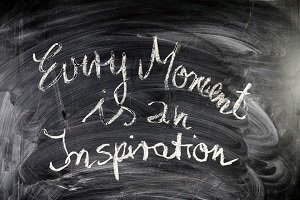 Is inspiration necessary in a creative line of work, or is it just an invention of self-important artists who try to picture their activity as something mysterious and different from any other vocation? These two extreme opinions and any number of intermediate ones have their supporters and antagonists; reality, as usual, is more complicated.
Is inspiration necessary in a creative line of work, or is it just an invention of self-important artists who try to picture their activity as something mysterious and different from any other vocation? These two extreme opinions and any number of intermediate ones have their supporters and antagonists; reality, as usual, is more complicated.
Among artists themselves there is also no unanimity; but from a practical standpoint their attitude towards inspiration may be roughly divided into three approaches: those who wait for it, those who seek it and those who don’t believe in it at all.
Those who wait for inspiration are probably the closest to the popular image of an artist: a brooding individual jumping between periods of hectic activity when visited by a muse and spells of languid torpor when inspiration doesn’t deign to appear.
Those who seek inspiration are a much more interesting case: they actively induce inspiration to appear. Methods vary greatly: from innocuous writing techniques to mind-altering drugs.
For example, a well-known American writer, artist and all-round creative person Julia Cameron perceives inspiration and creativity as something divine – which didn’t deter her from creating a 12-step system aimed at evoking and nurturing this state.
Famous artist Salvador Dali made use of hypnagogic hallucinations – visions we all tend to see just before falling asleep but usually forget afterwards. Dali devised a system that allowed him to retain the memory of them: he sat down holding a heavy key suspended over a metal plate on the floor. As he began to drift off to sleep, the key dropped and the sound of it hitting the plate woke him up.
But the most interesting case still is that of artists who don’t think much of inspiration at all – and there are many more of them than you may believe. Jack London simply had a daily quota of how many words he had to put out, no matter what. Franz Kafka followed a strict daily routine of work, time spent with family and writing, doing the same things at the same time day after day. A number of other writers and other creative people, such as Haruki Murakami, Michael Chabon and Maya Angelou do the same: they create daily rituals and let the routine drive them on.
Which of these approaches is the best? Probably the one that works for each particular person.
References
- Baird, B., S. Smallwood, J.W. Schooler. “Back to the Future: Autobiographical Planning and the Functionality of Mind-Wandering.” Consciousness and Cognition 20: 1604-1611. Print
- Cameron, Julia. The Vein of Gold: A Journey to Your Creative Heart. Los Angeles, United States, 2002. Print
- Dali, Salvador. Fifty Secrets of Magic Craftsmanship. Whitefish, United States, 2010. Print
- Dijksterhuis, A, T. Meurs. “Where Creativity Resides: The Generative Power of Uncounscious Thought.” Consciousness and Cognition 15: 135-146. Print
- Ratliff, Ben. “Popcast: Jen Shyu and Musical Inspiration”. The New York Times. Sep. 15 2015
- Rego, Paula. “Painting Is not a Career. It’s an Inspiration”. The Guardian. 15 2015
Stenham, Polly, et al. “Top Artists Reveal How to Find Creative Inspiration”. The Guardian. Jan. 2 2012